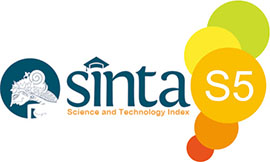EFEK PLATFORM PEMBELAJARAN VIRTUAL TERHADAP PENINGKATAN KETERAMPILAN MAHASISWA DALAM MERANCANG DAN MEMPRODUKSI APLIKASI ONLINE VIRTUAL LABORATORY
 ),
), (1) KTP
(2) Universitas Negeri Padang
 Corresponding Author
Corresponding Author
DOI : https://doi.org/10.24036/et.v9i1.112978
Full Text:
 Language : id
Language : id
Abstract
The increasingly widespread use of virtual learning applications in educational institutions requires educators to improve their skills in designing and producing these applications. A new VLP is proposed in this study to cultivate students' skills in designing and producing an online virtual laboratory (OVL). To test the effect of VLP, 30 students of the Educational Technology Study Program FIP UNP who took the Computer Fundamentals course for the July-December 2020 Semester participated in this study using a pre-test and post-test. Data were collected using online instruments; achievement tests, performance observation cards, product evaluation cards, and usability questionnaires. The results showed that the proposed VLP was effective in increasing students' knowledge and practical skills needed to design and produce OVL. Students find VLP a convenient way to learn relevant knowledge and skills.
Keywords: Virtual Learning Platform; Online Virtual Laboratory; Education technology; Design Skills
References
Ahmed, M. E., & Hasegawa, S. (2014). An instructional design model and criteria for designing and developing online virtual labs. International Journal of Digital Information and Wireless Communications (IJDIWC), 4(3), 355–371. doi: http://dx.doi.org/10.17781/P001289
Bajpai, M. (2013). Developing concepts in physics through virtual lab experiment: An effectiveness study. Techno LEARN: An International Journal of Educational Technology, 3(1), 43–50.
Cheesman, M. J., Chen, S., Manchadi, M.-L., Jacob, T., Minchin, R. F., & Tregloan, P. A. (2014). Implementation of a virtual laboratory practical class (VLPC) module in pharmacology education. Pharmacognosy Communications, 4(1), 2–10. doi:10.5530/pc.2014.1.2
El-Sabagh, H. A. E. A. (2011). The impact of a web-based virtual lab on the development of students’ conceptual understanding and science process skills. Doctoral thesis, Dresden University of Technology, Dresden, Germany.
Herga, N. R., & Dinevski, D. (2012). Virtual laboratory in chemistry - Experimental study of understanding, reproduction and application of acquired knowledge of subject’s chemical content. Organizacija, 45(3), 108–116. doi: 10.2478/v10051-0120011-7
Lampi, E. (2013). The effectiveness of using virtual laboratories to teach computer networking skills in Zambia. Doctoral thesis, Virginia Polytechnic Institute and State
University, Blacksburg, VA, USA. Retrieved from
Sun, K., Lin, Y., & Yu, C. (2008). A study on learning effect among different learning styles in a Web-based lab of science for elementary school students. Computers & Education, 50(4), 1411–1422. doi: 10.1016/j.compedu.2007.01.003
Tüysüz, C. (2010). The effect of the virtual laboratory on students’ achievement and attitude in chemistry. International Online Journal of Educational Sciences, 2(1), 37– 53.
Yang, K. Y., & Heh, J. S. (2007). The impact of internet virtual physics laboratory instruction on the achievement in physics, science process skills and computer attitudes of 10th-grade students. Journal of Science Education and Technology, 16(5), 451–461. doi: 10.1007/s10956-007-9062-6
Zacharia, ZC (2007). Membandingkan Dan Menggabungkan Eksperimen Nyata dan Virtual: Upaya untuk Meningkatkan Pemahaman Konseptual Mahasiswa tentang Rangkaian Listrik. Jurnal Pembelajaran Berbantuan Komputer, 23(2), 120–132. doi: 10.1111 / j.1365-2729.2006.00215.
 Article Metrics
Article Metrics
 Abstract Views : 174 times
Abstract Views : 174 times
 PDF (Bahasa Indonesia) Downloaded : 29 times
PDF (Bahasa Indonesia) Downloaded : 29 times
Refbacks
- There are currently no refbacks.





